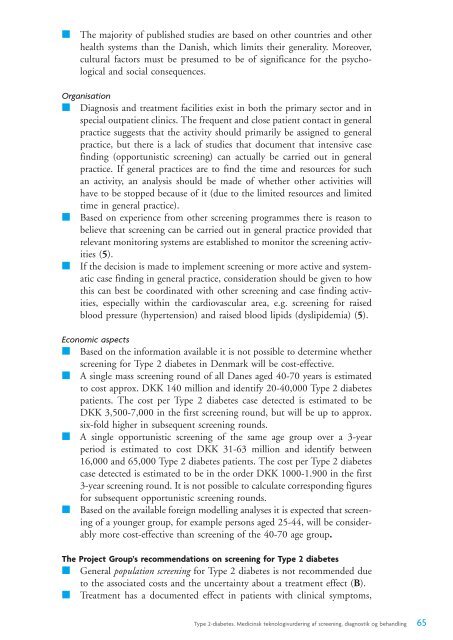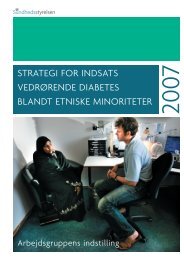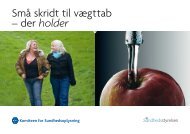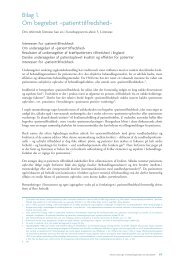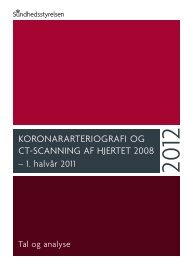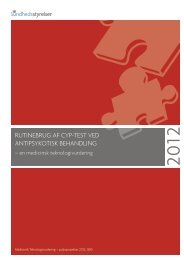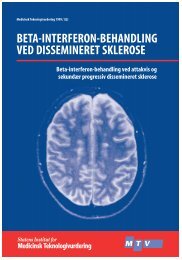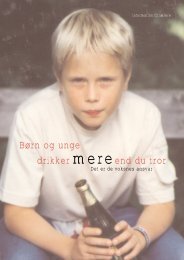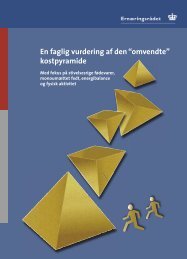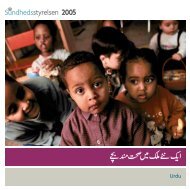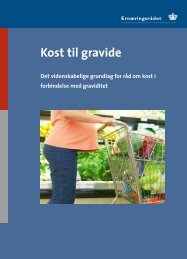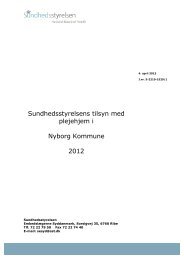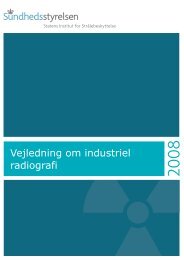- Page 1 and 2:
Center for Evaluering og Medicinsk
- Page 3:
Forord Type 2-diabetes bliver en af
- Page 6 and 7:
Speciallæge i Almen Medicin Erik M
- Page 8 and 9:
Reservelæge Michael Rahbek Schmidt
- Page 10 and 11:
3.6.2 Omkostninger ved screening i
- Page 12 and 13:
6.5.3 Neuropati 289 6.5.4 Screening
- Page 14 and 15: H Kapitel 6 vurderer screening for
- Page 16 and 17: FBG - faste-blodglukose FPG - faste
- Page 18 and 19: etrospektiv - bagudskuende RR - rel
- Page 20 and 21: H Det kan ikke anbefales at indfør
- Page 22 and 23: Sundhedsøkonomiske beregninger vis
- Page 24 and 25: Sammenfatning Type 2-diabetes melli
- Page 26 and 27: Økonomi H Diagnostik er billigst p
- Page 28 and 29: Teknologi H Der foreligger validere
- Page 30 and 31: H Indtil der foreligger evidens for
- Page 32 and 33: H Patienter i behandling med sulfon
- Page 34 and 35: H Bedre dokumentation for selvstæn
- Page 36 and 37: H Erkendelse af, at der ikke er kap
- Page 38 and 39: Fra en sundhedsøkonomisk betragtni
- Page 40 and 41: H Patienter med risiko for fodsår
- Page 42 and 43: Der findes flere forskellige lægem
- Page 44 and 45: forebyggende effekt på åreforkalk
- Page 46 and 47: mulighed for at nedbringe sygelighe
- Page 48 and 49: På baggrund af disse analyser konk
- Page 50 and 51: H Diabetisk nervebetændelse (neuro
- Page 52 and 53: H Der findes ikke undersøgelser, d
- Page 54 and 55: kvalitet forbedres. Sådanne beregn
- Page 56 and 57: Main conclusions and recommendation
- Page 58 and 59: Health economic calculations of the
- Page 60 and 61: Summary Type 2 diabetes mellitus is
- Page 62 and 63: sociation - Impaired Fasting Glycem
- Page 66 and 67: and these patients should be identi
- Page 68 and 69: H In weight-neutral diets it seems
- Page 70 and 71: Home measurement of blood glucose R
- Page 72 and 73: the best results, although the numb
- Page 74 and 75: accept permanent changes in lifesty
- Page 76 and 77: H The recommended diabetic diet con
- Page 78 and 79: From a review of the literature it
- Page 80 and 81: sive drugs for 10 years (1b). The r
- Page 82 and 83: On the basis of these and other stu
- Page 84 and 85: often lifelong pharmacological trea
- Page 86 and 87: Diagnosis and screening for late co
- Page 88 and 89: the diagnosis is made, and approx.
- Page 90 and 91: H If screening for late complicatio
- Page 92 and 93: and treatment of these patients pre
- Page 94 and 95: i stedet på grund af den store væ
- Page 96 and 97: holdninger, som forfatterne af denn
- Page 98 and 99: Ud over den af patienten foretagne
- Page 100 and 101: 2 Diagnostik ved mistanke om type 2
- Page 102 and 103: Plasma er den vandige del af en blo
- Page 104 and 105: lev inviteret, og halvdelen deltog.
- Page 106 and 107: Danmarks Statistik (19), og disse e
- Page 108 and 109: H Måling af plasmaglukose er mere
- Page 110 and 111: 3 Screening for type 2-diabetes Opg
- Page 112 and 113: gennemgår ikke regelmæssig screen
- Page 114 and 115:
3.2.2 Egnede test eller undersøgel
- Page 116 and 117:
sen af ikke-erkendt diabetes så h
- Page 118 and 119:
Kombinerede strategier Som det frem
- Page 120 and 121:
sen. Ét danskledet internationalt
- Page 122 and 123:
merne, herunder at deltage i et scr
- Page 124 and 125:
falsk positiv diagnose ved mammogra
- Page 126 and 127:
viden om, med hvilket interval en s
- Page 128 and 129:
oplagt mulighed at benytte det over
- Page 130 and 131:
TABEL 3.6.1.1 Udenlandske omkostnin
- Page 132 and 133:
Screening og/eller andre diabetesin
- Page 134 and 135:
foretaget en egentlig diagnostik. D
- Page 136 and 137:
ner, der får foretaget diagnostik
- Page 138 and 139:
ere symptomer og en mere alvorlig s
- Page 140 and 141:
4 Non-farmakologisk behandling af t
- Page 142 and 143:
mellemmåltider - er ikke associere
- Page 144 and 145:
4.1.5 Polyoler Indtagelse af polyol
- Page 146 and 147:
med type 2-diabetes-patienter finde
- Page 148 and 149:
er specielt gunstigt for type 2-dia
- Page 150 and 151:
H Når moderate mængder alkohol in
- Page 152 and 153:
tarmen. Der skal dog indtages stør
- Page 154 and 155:
Som det diskuteres senere, øger mo
- Page 156 and 157:
almenpraksis (331) (1b). I alt 311
- Page 158 and 159:
kun indtagelse af små måltider. I
- Page 160 and 161:
Delkonklusion H Både vægtreduktio
- Page 162 and 163:
diabetes-patienter i gennemsnit kun
- Page 164 and 165:
indeks som den primære strategi i
- Page 166 and 167:
4.2.1 RCT og metaanalyse Tre uafhæ
- Page 168 and 169:
af strimler til hjemmemåling af bl
- Page 170 and 171:
Effekten af fysisk træning er unde
- Page 172 and 173:
uafhængig risikofaktor for apoplek
- Page 174 and 175:
undervisning af type 2-diabetes-pat
- Page 176 and 177:
indeholdt 6 kontakter over en perio
- Page 178 and 179:
I Danmark har behandlingen af type
- Page 180 and 181:
praktiserende læger varierer meget
- Page 182 and 183:
Delkonklusion vedrørende undervisn
- Page 184 and 185:
Multidisciplinært team Der er ikke
- Page 186 and 187:
4.8.1 Delkonklusion H Organisatione
- Page 188 and 189:
om året og et sæt indlæg til sko
- Page 190 and 191:
TABEL 4.10.1.5 Omkostninger (kr.) o
- Page 192 and 193:
Delkonklusion H Før der er udvikle
- Page 194 and 195:
Rygning H Rygning forværrer de sen
- Page 196 and 197:
erindres, at grundlaget for de fore
- Page 198 and 199:
5 Farmakologisk behandling af type
- Page 200 and 201:
klinisk kontrollerede undersøgelse
- Page 202 and 203:
5.1.1 Farmakologisk behandling af o
- Page 204 and 205:
TABEL 5.1.2.1 Lægemidler med blodg
- Page 206 and 207:
Analyseres UKPDS-undersøgelsen som
- Page 208 and 209:
Ulemper ved intensiv blodglukosesæ
- Page 210 and 211:
Delkonklusion H Intensiv blodglukos
- Page 212 and 213:
te-kar-hændelser i hjerte og hjern
- Page 214 and 215:
TABEL 5.1.3.2 Randomiserede unders
- Page 216 and 217:
Resultaterne af disse undersøgelse
- Page 218 and 219:
Delkonklusion H Der er evidens for,
- Page 220 and 221:
te havde LDL-kolesterol over 2,6 mm
- Page 222 and 223:
Delkonklusion H Behandling med de l
- Page 224 and 225:
TABEL 5.1.5.1 Randomiserede unders
- Page 226 and 227:
ikke udelukkes. Desuden er der rejs
- Page 228 and 229:
TABEL 5.1.6.2 Randomiserede unders
- Page 230 and 231:
For de øvrige patienter uden tegn
- Page 232 and 233:
H Intensiv polyfarmakologisk behand
- Page 234 and 235:
støttesystemer for den praktiseren
- Page 236 and 237:
En anden dansk undersøgelse har vi
- Page 238 and 239:
sundhedsvæsenet, risikofaktornivea
- Page 240 and 241:
H Manglende social støtte (621) (2
- Page 242 and 243:
5.4 Økonomi Dette afsnit handler o
- Page 244 and 245:
samlede direkte behandlingsomkostni
- Page 246 and 247:
TABEL 5.4.2 Forventet ressourceforb
- Page 248 and 249:
denne gruppe er ikke kendt, men kan
- Page 250 and 251:
Andre økonomiske analyser Ud over
- Page 252 and 253:
TABEL 5.4.4 Fortsat fra forrige sid
- Page 254 and 255:
H Kolesterolsænkende medicin (læg
- Page 256 and 257:
delse af farmakologisk behandling o
- Page 258 and 259:
6 Diagnostik og screening for senko
- Page 260 and 261:
højere forekomst af retinopati end
- Page 262 and 263:
Under optimale forhold med fundusfo
- Page 264 and 265:
neres lavere (135/85) hos diabetesp
- Page 266 and 267:
Effektiviteten af screening for dia
- Page 268 and 269:
evt. mistet gangfunktion. Endvidere
- Page 270 and 271:
Desforuden foretages en sensibilite
- Page 272 and 273:
delse med blodprop eller fejl i hje
- Page 274 and 275:
diseret med henblik på, hvilken be
- Page 276 and 277:
usikkerhed, med mange falsk negativ
- Page 278 and 279:
H Øjenlæge med speciale i diabeti
- Page 280 and 281:
FIGUR 6.5.1 Screeningsmodeller for
- Page 282 and 283:
udgangspunkt i fundusfotografering
- Page 284 and 285:
der gennemføres vitrektomi i 20% a
- Page 286 and 287:
Køb af lydbøger Pårørendes ufor
- Page 288 and 289:
screeningsmodeller bør analyseres
- Page 290 and 291:
sikopatienter ved screeningen - alt
- Page 292 and 293:
øvrige undersøgelser tyder på, a
- Page 294 and 295:
40% af type 2-diabetes-patienter po
- Page 296 and 297:
omkostningerne og konsekvenserne af
- Page 298 and 299:
Fælles nationale behandlingsmål f
- Page 300 and 301:
tabte interventionsgruppen 4,2 kg (
- Page 302 and 303:
cebogruppen var 49% (p0,05). Blandt
- Page 304 and 305:
9 Bilagsfortegnelse 1) Kort beskriv
- Page 306 and 307:
tion, change of lifestyle/behaviour
- Page 308 and 309:
Antikoagulerende farmaka Patient/pr
- Page 310 and 311:
Bilag 2 Evidensniveauer og styrkegr
- Page 312 and 313:
H FBG 5,5-6,0 mmol/l, foretages en
- Page 314 and 315:
Ved 1. konsultation får alle (100%
- Page 316 and 317:
FIGUR 2. 316 Type 2-diabetes. Medic
- Page 318 and 319:
Bilag 4 Enhedsomkostninger Ydelse E
- Page 320 and 321:
FIGUR 1. Resultat af metaanalyse af
- Page 322 and 323:
Studier, der belyser effekten af fy
- Page 324 and 325:
tillige indført en vandrejournal f
- Page 326 and 327:
foreligger der ingen publicerede da
- Page 328 and 329:
lysninger fra øjenafdelingen, Årh
- Page 330 and 331:
B) Oversigt over populationen, der
- Page 332 and 333:
Bilag 10 Overgangssandsynligheder b
- Page 334 and 335:
Litteratur 1 Sundhedsstyrelsens arb
- Page 336 and 337:
26 Harris MI, Klein R, Welborn TA,
- Page 338 and 339:
49 Pardini VC, Pardini H, Velho G.
- Page 340 and 341:
74 Bantle JP, Laine DC, Thomas JW.
- Page 342 and 343:
98 Brand-Miller J, Hayne S, Petocs
- Page 344 and 345:
122 Gougeon R, Styhler K, Morais JA
- Page 346 and 347:
146 Schwab US, Ausman LM, Vogel S,
- Page 348 and 349:
168 Friedberg CE, Janssen MJ, Heine
- Page 350 and 351:
192 Schaefer EJ, Lichtenstein AH, L
- Page 352 and 353:
216 Abraham AS, Brooks BA, Eylath U
- Page 354 and 355:
240 The sixth report of the Joint N
- Page 356 and 357:
263 Sacks FM, Obarzanek E, Windhaus
- Page 358 and 359:
287 Campbell LV, Marmot PE, Dyer JA
- Page 360 and 361:
310 Henry RR, Scheaffer L, Olefsky
- Page 362 and 363:
334 Gaede P, Beck M, Vedel P, Peder
- Page 364 and 365:
358 Pories WJ, Swanson MS, MacDonal
- Page 366 and 367:
382 Klonoff DC, Schwartz DM. An eco
- Page 368 and 369:
404 Haire-Joshu D, Glasgow RE, Tibb
- Page 370 and 371:
427 Maser RE, Steenkiste AR, Dorman
- Page 372 and 373:
452 Haire-Joshu D, Ziff S, Houston
- Page 374 and 375:
477 Hickman M, Drummond N, Grimshaw
- Page 376 and 377:
502 Rettig BA, Shrauger DG, Recker
- Page 378 and 379:
mine in obese female subjects with
- Page 380 and 381:
550 Tarnow L, Rossing P, Gall MA, N
- Page 382 and 383:
disease in subjects with type 2 dia
- Page 384 and 385:
improve the management of diabetes
- Page 386 and 387:
619 Cramer JA, Mattson RH, Prevey M
- Page 388 and 389:
644 Stratton IM, Kohner EM, Aldingt
- Page 390 and 391:
668 Facey K, Cummins E, Macpherson
- Page 392 and 393:
the diabetic foot. International Wo
- Page 394 and 395:
715 Folsom AR, Eckfeldt JH, Weitzma
- Page 396 and 397:
740 Maschorek T, Sørensen MC. Omko


